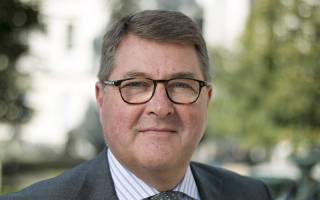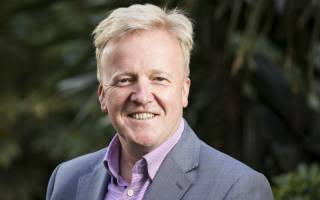UCL names new Pro Vice-Provosts for London and Artificial Intelligence
6 June 2019
Two new UCL Pro-Vice-Provosts, for London and for Artificial Intelligence, have been appointed to strengthen the delivery of the institutional strategy, UCL 2034.

Professor Alan Thompson, Dean of Brain Sciences, will serve as Pro-Vice-Provost (London), and Professor Geraint Rees, Dean of Life Sciences, will serve as Pro-Vice-Provost (Artificial Intelligence).
As Pro Vice-Provost (London), Professor Thompson will lead and coordinate UCL’s activities to consolidate and advance its position as London’s global university – in, of and for London.

Professor Thompson says: “This is a great opportunity to raise the profile of UCL in London and to underline how London benefits from UCL and, in turn, how UCL benefits from being at the very heart of London. I am delighted to be taking on this role and look forward to engaging with everyone working in this space in UCL and beyond to achieve these objectives.”
Current projects illustrating UCL’s commitment to London include:
• The development of UCL East – working in partnership with the GLA, London Legacy Development Corporation, the cultural and heritage sector, other HE institutions and the local community to create an innovative education and cultural hub on the Queen Elizabeth Olympic Park
• UCL Centre for Access to Justice – an integrated health and legal service providing pro bono legal advice to vulnerable communities in East London, tackling the mental and physical ill-health that can result from lack of access to legal advice
• Camden Clean Air Partnership – led by UCL and bringing together residents, businesses, schools and other organisations to pioneer radical new ways to improve Camden’s air quality, and helping to develop the Camden Clean Air Action Plan
• The London Project to Cure Blindness - for the past 10 years, been developing cell-based treatments to cure blindness associated with age-related macular degeneration (AMD). The project aims to bring stem cell therapy for retinal diseases, to the clinic as rapidly as possible
UCL’s London strategy is led by the Office of the Vice-Provost (Advancement), headed by Lori Houlihan, who will work closely with Professor Thompson to set the strategy
As the Pro-Vice-Provost (Artificial Intelligence) – reporting to Professor David Price, Vice-Provost (Research) – Professor Rees will be UCL’s strategic lead for artificial intelligence (AI), ensuring that the university’s AI activity is greater than the sum of its parts, and engaging relevant researchers with industry, policymakers, partners and supporters in mutually beneficial relationships.

“UCL should seek to deliver AI impact for public benefit, so a key aspect of my role will be outward-facing and ambassadorial. In service of colleagues across UCL and working with UCL Innovation & Enterprise, I will establish and maintain relationships with key global technology partners, domain-specific partners (e.g. in education) and with the Government, NHS and other public bodies.”
Professor Price said: “AI is a transformative technology, which will have dramatic impacts on the way people live and work and the way economies function. I am confident that with Geraint’s inclusive and collaborative style of leadership, UCL can fulfil its unique potential to contribute to the positive development of AI, its social applications and implications.”
 Close
Close

